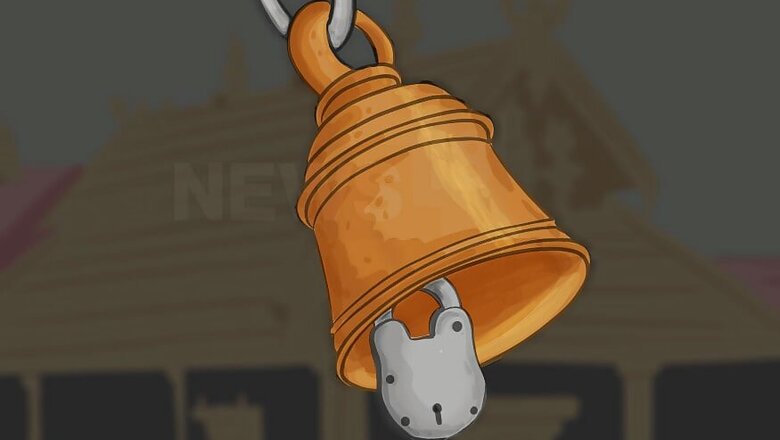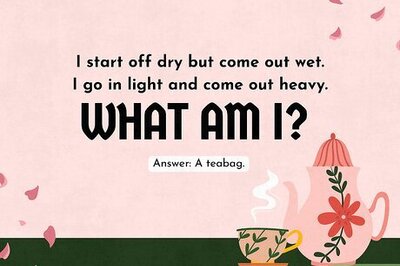
views
New Delhi: "Compliance is not a matter of option," said Justices RF Nariman and DY Chandrachud, in their minority verdict that gave a dissenting view by dismissing all the review pleas and directing compliance of its September 28 decision and said that the oath to "bear true faith and allegiance to the Constitution of India" extended from the Prime Minister and his cabinet, to chief ministers and state ministers, to MPs and MLAs.
The Supreme Court on Thursday referred to a seven-judge bench petitions that sought to review its 2018 judgment which had allowed the entry of women, of all ages, into Kerala's Sabrimala Temple. The bench said it would re-examine various religious issues, including the entry of women into mosques, and the practice of female genital mutilation in the Dawoodi Bohra community.
The five-judge bench unanimously agreed to refer the religious issue to a larger bench, it gave a 3:2 split decision on petitions seeking a review of the apex court's September 2018 decision. The majority verdict by Chief Justice Ranjan Gogoi and Justices AM Khanwilkar and Indu Malhotra decided to keep pending the pleas seeking a review of its decision regarding the entry of women into the shrine, and said restrictions on women in religious places was not restricted to Sabarimala alone and was prevalent in other religions as well.
Justice Nariman was part of a five-judge bench that decided, in a 3:2 majority ruling, to refer to a larger, seven-member bench all pleas seeking a review of the Supreme Court's decision to throw open the Sabarimala temple to all women. Nariman and Chandrachud dissented and dismissed all review pleas while directing compliance with the Supreme Court's original decision.
"What a future constitution bench or larger bench, if constituted by the learned Chief Justice of India, may or may not do when considering the other issues pending before this Court is, strictly speaking, not before this Court at all," they said, and noted that the "only thing" before the court were the petitions before them.
In particular, they noted when the judicial process, based on a "sense of objectivity and fairness" and "remedies within a rule of law framework provide recourse to all those who may be and are affected by the course of a judicial decision", is complete, "it is the decision of the Supreme Court and binds everyone. Compliance is not a matter of option. If it were to be so, the authority of the court could be diluted at the option of those who are bound to comply with its verdicts."
The Prime Minister and members of his cabinet, they noted were bound by oath in the Third Schedule "bear true faith and allegiance to the Constitution of India as
by law established, but also that they will do right to all manner of people, in accordance with the Constitution and the law, without fear or favour, affection or ill will." The same applied for chief ministers and state ministers,
"Any deviation from this high constitutional principle is in derogation of the oath taken by every Minister and Legislator during his term of office. Once this is
clearly understood and followed, the rule of law is established, and the shameful spectacle of political parties running after votes, or instigating or tolerating mob violence, in defiance of decrees or orders passed by the Supreme Court of India does not reign instead," they said.
They added, "Bona fide criticism of a judgment, albeit of the highest court of the land, is certainly permissible, but thwarting, or encouraging persons to thwart, the directions or orders of the highest court cannot be countenanced in our Constitutional scheme of things...Let every person remember that the “holy book” is the Constitution of India, and it is with this book in hand that the citizens of India march together as a nation."
On the exclusion of women between the ages of 10-50 from the shrine, they said, "What has to be seen in the judgments of this Court is whether such practice is an essential practice relatable to the Hindu religion, and not the practice of one particular temple. Nothing has been shown to us, as was correctly pointed out by the learned Chief Justice, from any textual or other authorities, to show that exclusion of women from ages 10 to 50 from Hindu temples is an essential part of the Hindu religion."
They also rejected "extreme arguments" that were made that "belief and faith are not judicially reviewable by courts, and that this Court cannot interfere by stating that a particular section of persons shall not hold a particular belief and act in accordance thereto." In the minority verdict, they noted, "The slippery-slope argument, that this judgment will be used to undermine the religious rights of others, including religious minorities, is wholly without basis."
On the issue of locus-standi to file a public interest litigation, wherein Justice Indu Malhotra had in her dissenting judgement held that to entertain a PIL at behest of those who weren't worshipers at the Sabrimala temple would open the floodgates to petitions questioning the validity, they said, "We have pointed out in this judgment that the majority judgment cannot be used to undermine the religious rights of others, including, in particular, religious minorities."




















Comments
0 comment